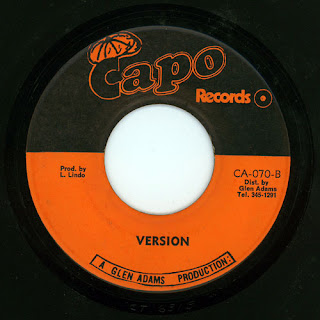It's a thesis song and it speaks for itself. "The whole concept of this video is to basically show how the two worlds collide. I have a street background coming from The Clipse, the Re-Up Gang. Tyler comes from this independent subculture. I think people would not expect for us to be able to make a record that's so fundamentally hiphop sounding." Got it.
We have no need to write on the self evident and we don't work on our fresh in these pages, but there's so much blue devilin' in the track, we thought we'd drop a couple of footnotes on you.
We begin 97 years ago, w/ Richard M. Jones, the ancestor who conjured one of the dominators of the 20th c., "Trouble in Mind," in 1924. It's a song so familiar that it's gruesome ending, when the narrator commits suicide by letting a train crush his head, has become inaudible. Did I hear someone holla "Yonkers" nearly a century later? We thought we heard something from the back of the club. Satisfy my mind, ya dig?
It's easy to take Jones's tune one way, as a variation on the worried blues theme. As many covers as there are to the song there are very few real versions on it; the take is pretty standard.
Then we got worry's opposite: "So much trouble on my mind. I refuse to lose."
This back and forth puts Ralph Ellison's first rule of the blues into of our mind. The blues don't stay where you thought you put them. The blues swings front, back and side to side. Ellison tells us that the blues is "an impulse to keep the painful details and episodes of a brutal experience alive in one's aching consciousness, to finger the jagged grain, and to transcend it, not by the consolation of philosophy but by squeezing from it a near-tragic, near-comic lyricism." This is the rule we'a play by when we spin Pusha T and Tyler through the night, when we spin all of the trouble songs that come before and will come after, 'til the breakadawn.
We have no need to write on the self evident and we don't work on our fresh in these pages, but there's so much blue devilin' in the track, we thought we'd drop a couple of footnotes on you.
We begin 97 years ago, w/ Richard M. Jones, the ancestor who conjured one of the dominators of the 20th c., "Trouble in Mind," in 1924. It's a song so familiar that it's gruesome ending, when the narrator commits suicide by letting a train crush his head, has become inaudible. Did I hear someone holla "Yonkers" nearly a century later? We thought we heard something from the back of the club. Satisfy my mind, ya dig?
It's easy to take Jones's tune one way, as a variation on the worried blues theme. As many covers as there are to the song there are very few real versions on it; the take is pretty standard.
Then we got worry's opposite: "So much trouble on my mind. I refuse to lose."
This back and forth puts Ralph Ellison's first rule of the blues into of our mind. The blues don't stay where you thought you put them. The blues swings front, back and side to side. Ellison tells us that the blues is "an impulse to keep the painful details and episodes of a brutal experience alive in one's aching consciousness, to finger the jagged grain, and to transcend it, not by the consolation of philosophy but by squeezing from it a near-tragic, near-comic lyricism." This is the rule we'a play by when we spin Pusha T and Tyler through the night, when we spin all of the trouble songs that come before and will come after, 'til the breakadawn.
So we got the worries, but then we got the menace, the lyrical otherside of worry, knowhatimsaying? And you got the tragedy and the comedy all mixed up, too. They're ibeji, y'all. Just like in the video. But now we're writing about the self evident, so we should step out.
Here's a clip of troubles. Load your Mac w/ 'em and play on, kingz and queenz.
Thesis: The Worried Mind
- "Trouble in Mind Blues," Thelma La Vizzo, featuring Richard M. Jones, piano (1924).
- "Trouble in Mind," Chippie Hill, featuring Richard M. Jones, piano, and Louis Armstrong, cornet (1926). Reference version. Surprising how close the covers stay to the spirit of this one.
- "Trouble in Mind," Dinah Washington (1952). There is no better blues singer. Female Muddy Waters.
- "Trouble in Mind," Lightnin' Hopkins (1977).
- "Trouble in Mind," James Blood Ulmer (2003).
- "(I've Got) So Much Trouble on My Mind,"Sir Joe and Free Soul (1972). Funky retake of the old worried blues. "Give me the strength, 'cause everything I've got is gone."
- "Trouble," Shinehead (1992).
Antithesis: I Refuse to Lose
- "I Refuse to Lose," James Brown (1976). Ellpee version.
- "Wanna Rock," UTFO (1989). Flips Sir Joe into a boast.
- "Welcome to the Terrordome," Public Enemy. Huge, wild insertion into the tradition. Runs loose over the whole business.
- "Trouble in Mind," Natalie Gardiner (2003). Wild and sexy retake, adding both menace and confidence to the bluesy mix.
Synthesis: Whole Nother Devil, Dig?
- "So Much Trouble on My Mind," Pusha T, featuring Tyler the Creator (2011).












